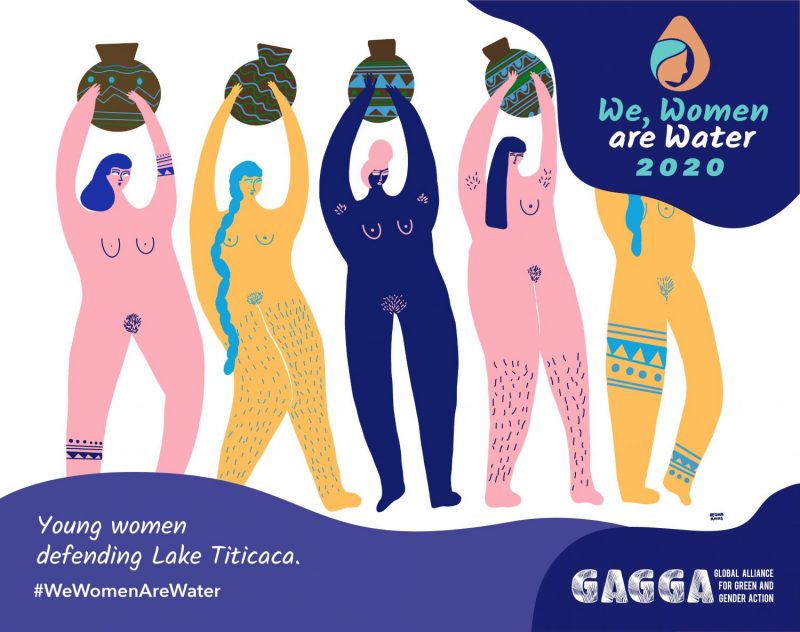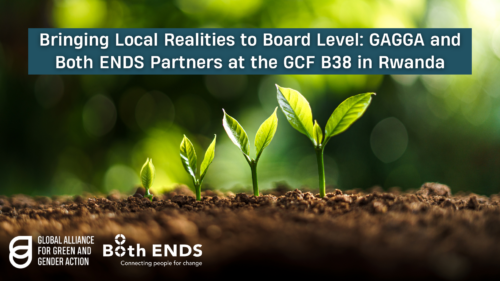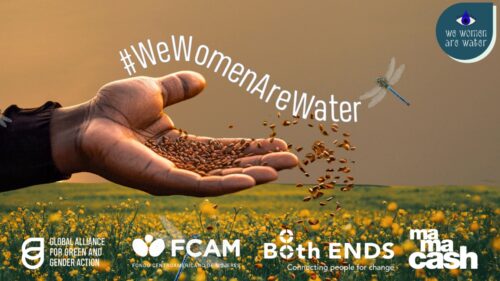We, Women are Water 2020: The young women defending Lake Titicaca

Lake Titicaca in the Andean highlands is the largest freshwater basin in South America. It represents a source of life, resources and identity for those who live and resist alongside it. Around 10% of the Bolivian population lives on the banks of this valuable natural space. The lake is sacred to the Inca people, and in recent decades the Bolivian region of the lake has been facing a crisis. Where in the past water was easy to find, flowing from the hills and at a depth of just two meters from the surface, now you have to drill up to 40 meters to find water. Not only is water now scarce — the lake is also contaminated.
In the community of Bahía Cohana there are three safe natural water sources from which water for human consumption is distributed. Every year from June to December, when the temperature drops to freezing point, water becomes scarce and the small amount that can be found is contaminated. Although the community has implemented strategies to collect water, it is not safe to drink and consuming it poses a serious health risk for families.
The young women of the community are working on strengthening the organization Centro Juvenil de Mujeres Cohana (Cohana Women’s Youth Center) and its defense of Lake Titicaca and its natural assets. Given the water shortages, they have driven forwards the installation of tanks to harvest rainwater — each of which has a capacity of up to 12,000 liters. Currently, more than 100 families have already had a tank installed.
The Cohana women are also giving trainings on efficient water use and proper water management, involving families, schools and the local community. Furthermore they are recovering ancestral knowledge from their “grandmothers, who had a lot of respect for water. [The Cohana women] sing to rain, water and nature.” Part of their advocacy strategy also includes making radio programs to raise public awareness about water management.
The Cohana Women’s Youth Center is raising demands to the municipal and national authorities that the government recognizes the scarcity and contamination of water is affecting the survival of the lake and the families that live there. The women are also calling on the Bolivian State and decision-makers to take action to facilitate access to sewage systems, as well as ensure all families can access good quality water and in sufficient quantities for family consumption and sustainable production activities.
Copyright © 2020 GAGGA. Image may not be copied, printed, edited or otherwise disseminated for commercial use without express written permission of GAGGA. The use of this image in its original form is otherwise allowed if credit is provided to GAGGA.

Welcoming Anamika Dutt As GAGGA’s Planning, Monitoring, Evaluation & Learning (PMEL) Officer!
Anamika Dutt is a feminist MEL practitioner from India. Anamika believes that stories of change and impact are best heard…

Bringing Local Realities to Board Level: GAGGA and Both ENDS Partners at the GCF B38 in Rwanda
Last week Both ENDS participated in the 38th Board Meeting of the Green Climate Fund in Kigali, Rwanda, together with…

We Women Are Water – Call To Action To Support And Finance Gender Just Climate Action
Gender just climate action and solutions are in urgent need of your support Women, girls, trans, intersex, and non-binary people…
Subscribe to our newsletter
Sign up and keep up to date with our network's collective fight for a gender and environmentally just world.
